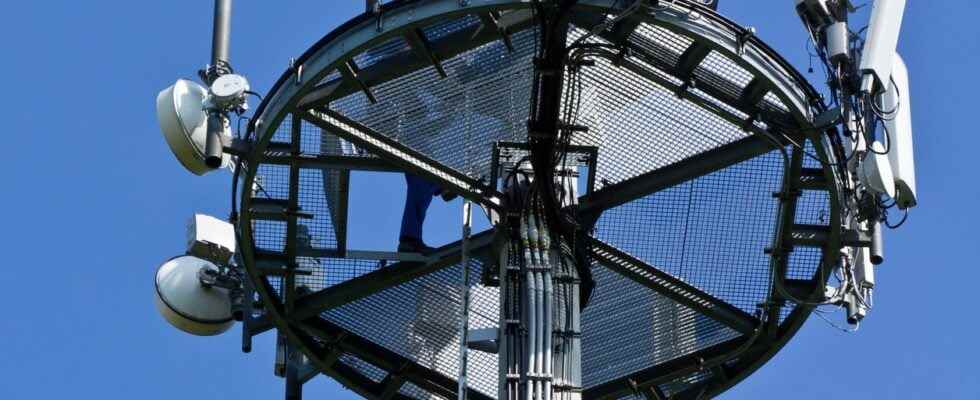“End of the 3G network in the USA on February 22, 2022. To continue to call and stay connected in the USA, you must equip yourself with a VoLTE compatible mobile (voice over 4G)”. You may have received this alert from your mobile operator in the past few days. 3G technology will indeed no longer be used by AT&T from February 22, then by T-Mobile this summer, and finally Verizon in December. Elsewhere in Europe, operators are also beginning to schedule the extinction of 3G. Germany and Denmark have already put an end to it and the list will grow in the coming years until 2025.
But the subject does not yet make consensus for the moment in France. The operators did not rush to answer us.
A decision that is up to the operators
It must be said that the end of 3G does not require a regulatory decision or a vast program validated by the State as for the decommissioning of copper. “Frequency allocation is technologically neutral so operators are free to stop 2G or 3G if they wish. However, we will ensure that they meet their coverage commitments with quality of service and performance.”tells us Anaël Bourrous, in charge of mission within the direction “mobile and innovation” at Arcep.
Same story on the side of the French Federation of Telecoms. “We are studying this subject, but we are not carrying it collectively at the moment, because it is competitive. It is part of the commercial strategy of each operator and can help to differentiate themselves »tells us Michel Combot, the general manager of the FFT.
During the controversies over the environmental impact of 5G before its launch in France, manufacturers in the sector had nevertheless affirmed that it would be compensated by the end of other obsolete technologies. An argument that does not convince Arcep. “Studies are underway, but it appears that the energy gains would not be so obvious. On the hardware side, some network equipment will have to be replaced, as well as obsolete user terminals”emphasizes Anaël Bourrous.
French territory soon to be completely covered in 4G
Among operators, however, the question of abandoning 3G arises seriously. They have just launched 5G and they have an obligation to switch all of their sites to 4G by the end of the year. Even in the white areas of rural areas where 2,500 new mobile sites were to be installed, only 15% remain that have not yet switched to 4G.
Maintaining 3G therefore has no interest in terms of territorial coverage or Internet access capacity. The problem is that the market is not ripe. There are still many 2G and 3G users in France. The two technologies are no longer separated, because 3G terminals are necessarily 2G.
The real problem is the professionals. Of the 22 million terminals listed by the telecom policeman in this sector, most are 2G/3G! Credit card payment machines, parking meters, remote alarms, pressure sensors, elevators, energy or transport meters, cash dispensers… the uses are still massive. Some machines equipped with a 2G/3G SIM card are sometimes welded or difficult to access. Merchants even end up forgetting that they are using a mobile service when the product is marketed by the manufacturer.
The case of car emergency calls
On the consumer market, Arcep still counts several million 2G/3G-only terminals, but also several million 4G smartphones that are too old to do voice over 4G (VoLTE) and therefore remain dependent on 2G and 3G to make calls. “There is a natural erosion each quarter on the general public side which encourages us to wait a little longer until we reach a ceiling… until there are only a few diehards left. It would then be possible to prevent them well in advance, as for the RTC or copper »says Michel Combot.
And there is the specific case of the eCall emergency call system for cars, which became mandatory in 2018 in Europe. It allows a damaged vehicle to instantly call for help via the mobile network. It works with… 2G and 3G. Fifteen million cars out of 300 million would be affected in Europe. For the moment, the solution would be to keep 2G when 3G stops or vice versa.
Also see video:
And if it was 2G that we stopped?
The question arises whether it would not be preferable to stop 2G. “Several extinction scenarios are possible. Stopping 3G offers the possibility of a fallback to 2G networks, the reverse is not true. On the other hand, 3G has the advantage of having better coverage, but more professionals depend on 2G”observes Arcep.
“The choice is not easy”abounds Michel Combot. “The interest of stopping 3G is that its Internet access can be replaced by 4G and that it will allow more frequencies to be reallocated”he points out.
Rest assured professionals. If 3G were to be stopped, 2G would therefore be maintained as a postponement solution. And they would be notified well in advance. In the meantime, French tourists who do not benefit from 4G or voice over 4G will have to gradually get used to without their smartphones abroad when they go to countries like the United States.
